#augustus sinclair
Text

I'm sorry, I don't have much time nowadays. I can only draw little doodles
#bioshock#bioshock 2#rapture#augustus sinclair#gilbert alexander#brigid tenenbaum#julie langford being brigid lover#people in love i'm dying
42 notes
·
View notes
Text
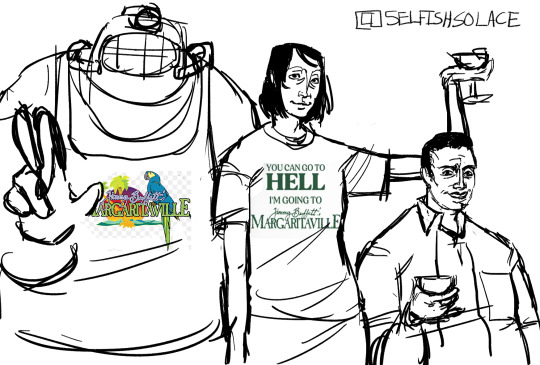

rip sinclair you would have loved taking eleanor and delta on a "sorry i essentially ruined both of your lives and traumatized you" vacation to margaritaville
281 notes
·
View notes
Text
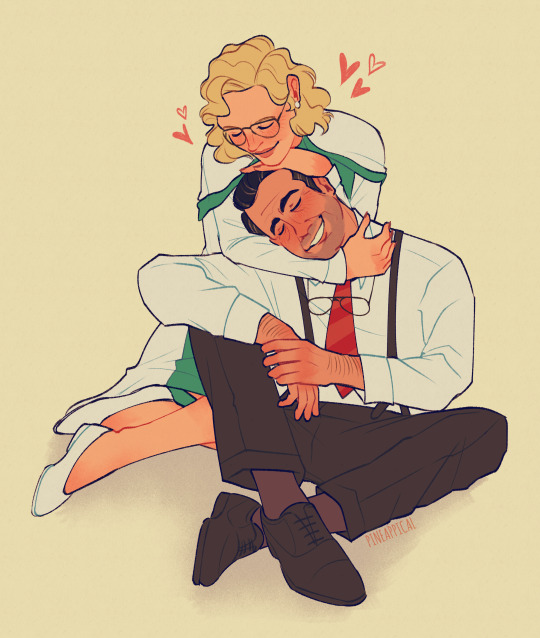
commission for @auld-man thank you!! ^^ 💛
#bioshock#bioshock 2#augustus sinclair#julie langford#god i actually miss drawing sinclair so thank u for this tbh <33#pn.art#pn.comms#bioshock fanart
163 notes
·
View notes
Text
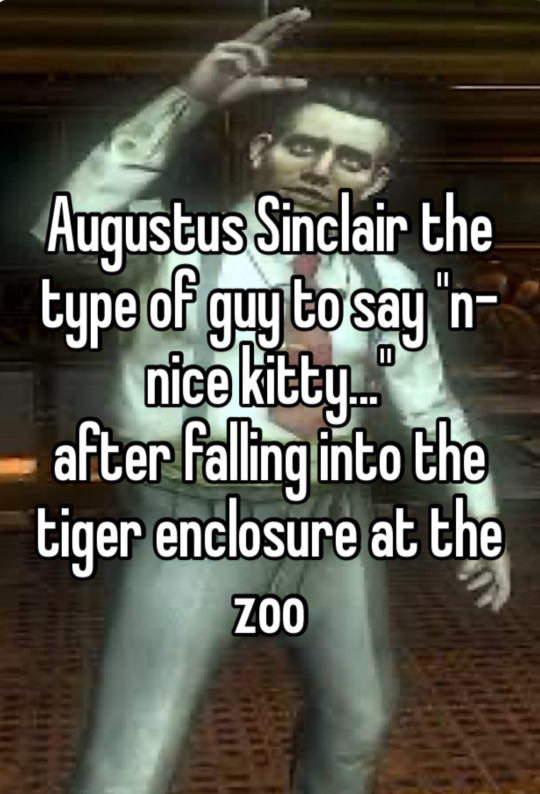
225 notes
·
View notes
Text

another commission for @auld-man, this time of sinclair from bioshock 2!
182 notes
·
View notes
Text

I pray every December 31st that he is happy in hell.
187 notes
·
View notes
Text
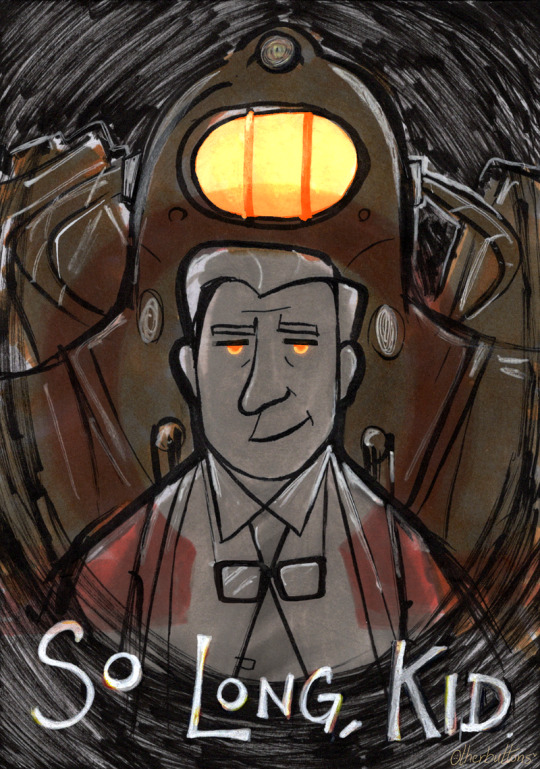
Thank you.
made art for a video game zine jam.
chose emotional self-warfare.
[ comms // shop ]
#We've been drawing a lot of Bioshock for a set of charms and this may or may not be a concept for one of them#We're between this with florescent orange or lenticular between sinclair's two forms#Lamb is 100% going to be glow in the dark blue if we can afford it though because of course#this is fanart and not our did introjects but let me tell you the disapproval from our sinclair for drawing this one was wild#he's given his blessing on the sinclair charm though because 'if it sells it sells' shoutout to our system's business advisor /hj#🍰 atticus#-- fanart#Bioshock#Bioshock 2#Bioshock Spoilers#Spoilers#Augustus Sinclair#illustration#Subject Omega
114 notes
·
View notes
Text


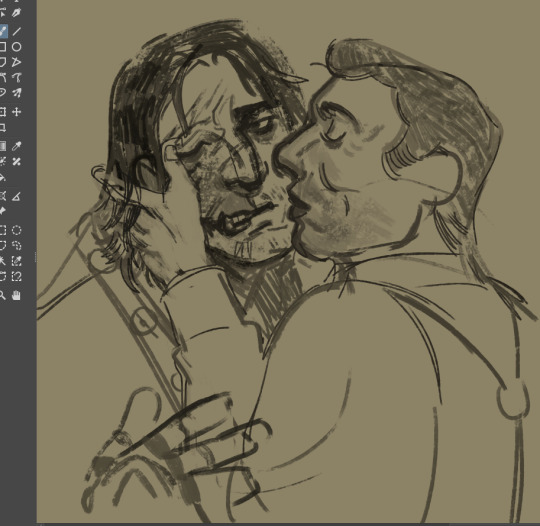

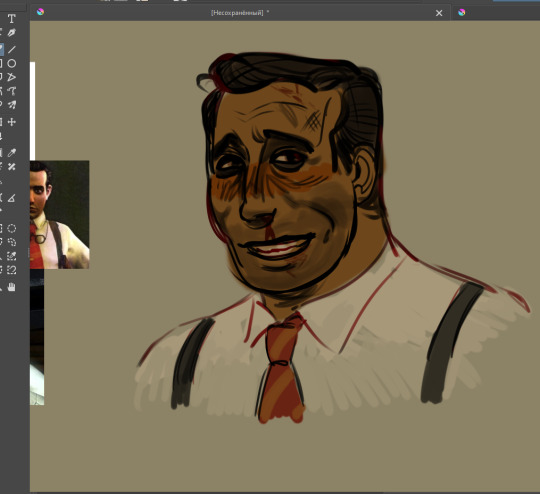
old bioshock doodles idk
132 notes
·
View notes
Text
Bioshock as vines
This is what happens when you have too much time at hands, oh well it was fun to make
#bioshock#bioshock meme#bioshock 2#bioshock infinite#bioshock jack#sander cohen#bioshock rapture#brigid tenenbaum#augustus sinclair#andrew ryan#frank fontaine#sofia lamb#elizabeth comstock#bioshock columbia#eleanor lamb#bioshock splicer#stanley poole#dr suchong#vine#memes
311 notes
·
View notes
Text

augustus sinclair and the mortifying ordeal of being under 5’6”
#bioshock#bioshock 2#subject delta#johnny topside#augustus sinclair#deltaclair#topclair#bioshock fanart#meme redraw#me and who. i’m sinclair /j#also i gave up on deltas suit details sorry
169 notes
·
View notes
Text
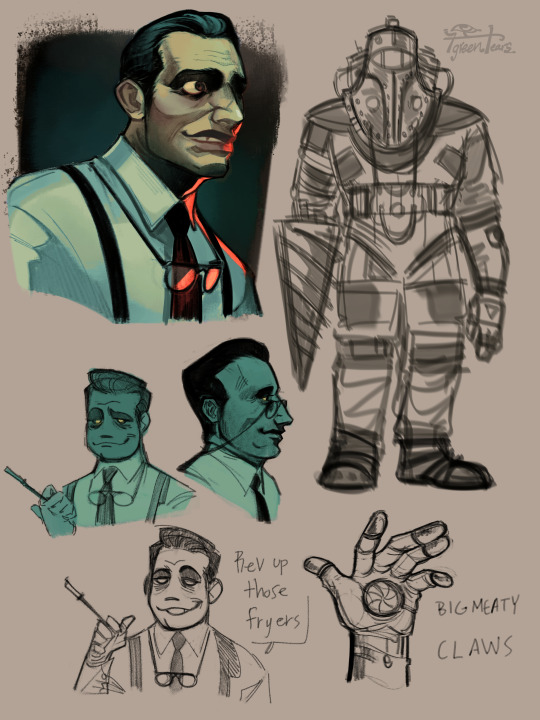
The M E N
#myart#bioshock 2#augustus sinclair#subject delta#johnny topside#sketches#im still not over Sinclairs death#spongebob references cause yeahhhhhh#i love old men
860 notes
·
View notes
Text
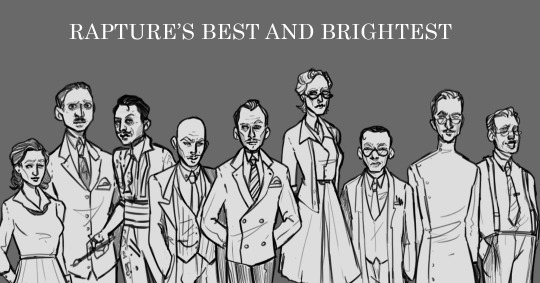
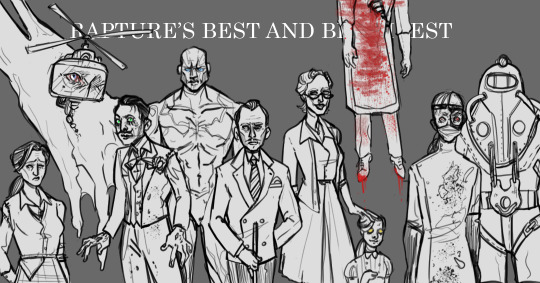
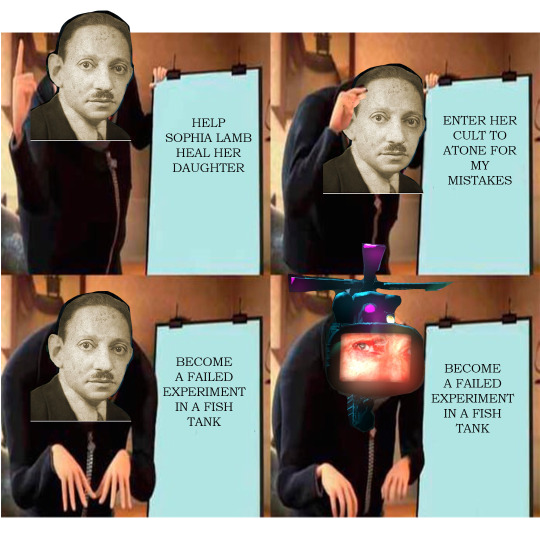
#bioshock#bioshock 2#andrew ryan#frank fontaine#sander cohen#gilbert alexander#yi suchong#sofia lamb#augustus sinclair#dr steinman
855 notes
·
View notes
Text
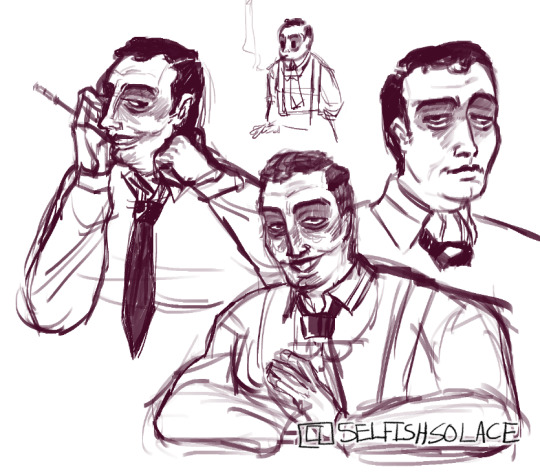
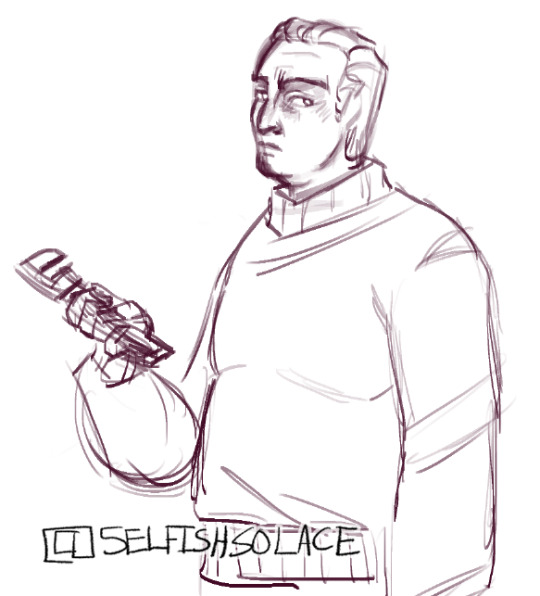
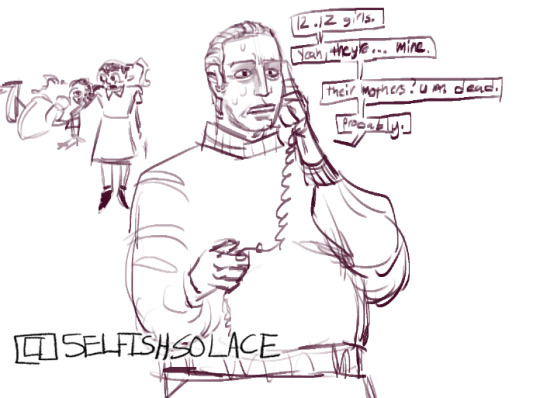
god answered my prayer for fat people in games with bioshock and bioshock 2
125 notes
·
View notes
Text



I’m trying to get used to drawing them
Anna is a girlboss though. 😊



78 notes
·
View notes
Text
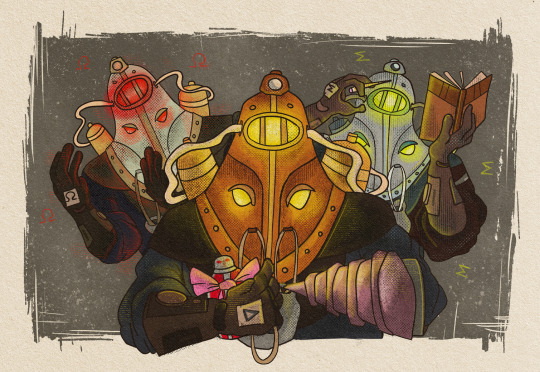
Test Subjects <3
#bioshock 2#bioshock 2 fanart#bioshock#bioshock fanart#johnny topside#subject delta#subject sigma#augustus sinclair#minervas den#also i tried to do something w/ subject omega where you could see his eyes in the suit but it didnt work well w/ the lighting and shading#but if you notice it just know that i tried
323 notes
·
View notes
Text
In Defense of BioShock Infinite
Although I had preordered BioShock Infinite with all its bells and whistles, I did not actually play it until January 2023. And lordy, I had me another Experience with a capital E. How the hell a bunch of urban Yanks could capture my experience as a queer democratic-socialist atheist struggling with her roots as a rural evangelical-cum-fascist is kinda magical, honestly. As to the game itself, it didn’t hurt how good it looked—the kickass skyhook gun battles—that novel setting—the complex characters—that delicious historical setting—that bloodthirsty critique of America—and to top it all off, they had pulled yet another Cassandra. Hell, speaking of which—not only was the game fun, it was fucking smart. It was intelligent, memorable, and meaningful in a way I hadn’t experienced in video games for years.
Now, back in 2013, when I had realized that I would be spoiled for Infinite, I left the BioShock fandom. After completing the game, I headed to Tumblr to re-engage, wagging my whole body like an excitable golden retriever, only to discover that BioShock Infinite was remarkably absent, and when mentioned, brutally derided.
“I hate BioShock Infinite and all my friends do, too,” someone said in the tags under a post.
I was utterly befuddled and deeply sad. I wanted to talk about BioShock Infinite! I wanted to dig into it, uncover unexpected ideas, learn new things, talk shit, make new friends—the full fandom experience. And instead I kept stumbling into hateful diatribes and super-charged disgust.
Obviously, I first looked at myself and my own judgment. Had I missed some obvious problem or misread some theme or dialogue? This wouldn’t be the first time I’d snapped down on a hook. But the more I thought about it, the angrier I got.
There are two parts of BioShock Infinite that are unquestionably terrible: the fridging of Daisy Fitzroy and the false equivalence of violence between haves and have-nots (lol what are the have-nots supposed to do, ask nicely?). Additionally, one could look at the use of real Native American tragedies as tasteless. Personally, I do not—in the same way that I don’t find it tasteless that real war victims were used as inspiration for Splicer deformities. This is what really happened; this is commentary on events that really happened to real people.
At this point, I’m sure I don’t have to explain why two of these themes are Unequivocally Bad.
Anyway, I thought that perhaps these were the reasons BSI had been condemned to Super Hell.
I was wrong.
How Criitcsim Werk
This wasn’t the fandom I’d made friends in over 2010. Hell, this wasn’t the fandom of 2013. This was a fandom made up of Babies. They were making their first coltish stumblings into media criticism and with it, dredging up the same brain-dead bullshit from Tumblr circa 2008.
Suddenly I was brought face to face with people who seemed to think that if a character couldn’t be likable or good that the story itself couldn’t be likable or good; that one bad element means the story is unsalvageable (lol u pussies); the implication that one is bad for liking it; the destructive juvenile insistence that media accurately measures its fans’ moral qualities en masse like an astrological sign. This goes far beyond simple like or dislike and plunges head-first into Puritanism: praying loudly on street-corners instead of quietly in a dark corner where God might hear you.
At one point I had a kid go off about how they wouldn’t take time to understand Booker DeWitt’s perspective because he had (fictionally) taken part in a genocide. (That same person said the Native American element had been employed for shock value, a thought that sometimes keeps me up at night, because it is legitimately one of the dumbest criticisms the game has ever received.) At another point I saw someone acting personally offended that (fictional person) Dr. Suchong’s (fictional) data was being stolen (in a fiction) by a (fictional) racist who would (fictionally) take credit for (fictional person) Suchong’s (fictional) inventions “while calling him slurs”. Sure, a better question would have been, “Why would the creative team opt to do this” rather than assume intentional racism from a Jewish creative director with an in-office multi-ethnic team in the year of our lord 2013, but why not handwave the choice with prurient moral dismay so your audience won’t beat you to death with bats?
It was as though fans were treating these completely fictional characters as real people whose personal gods had opted to torment them, and that their tormentors merited the kind of censure that psychopaths should receive. As I hope all of you understand, this is fucking madness.
More than once I saw people posting about hating the studio or the creative director in ways that seemed intense, unreasoning, and excessive—notably an “I Hate [Irrational Games creative director] Ken Levine” stamp (rofl the more things change amirite). People get so performatively moralistic about it that I started wondering if I missed something big along the way. Was there some secret Voxophone I missed swearing fealty to baby Hitler or some shit?
Double Standards
At the same time, I was utterly confused. BioShocks 1 and 2 both featured some absolutely ghastly bullshit based on real-life horrors and a thick mix of complicated human beings—many of them victims who have become monsters. The fact they are grounded in historical tragedies is a huge part of their appeal. Hell, I don’t think those games would have had half their meaning without World Wars I and II and the threat of a third.
A gay man who feels so cursed by his orientation that he is incapable of intimacy and systematically destroys his ex-lovers—including the man he loves the most. A Korean who survived Japanese occupation and a Jewish Holocaust survivor repeat the violence and traumas exacted upon them and their people, subjecting a new generation to agonies unthinkable. Chasing the shadows of Bolsheviks, a Russian citizen becomes the brutal tyrant that he loathed. A rich lawyer with an easygoing drawl designs a concentration camp and systematically harvests hundreds, if not thousands of political prisoners, selling them out to medical testing for a quick buck.
But a Native man who destroys his own people and class to ensure his own survival and social acceptability is too far? This character is where people drew the line, so much so that the entire game is disavowed? Hell, if you’re just talking about Booker (rather than Comstock), he doesn’t have anywhere near the largest bodycount. If we were to judge on the metric of human misery alone, Booker wouldn’t even hit the top ten.
Keep in mind that the most-discussed BioShock game on Tumblr is BioShock 2, and that one of the biggest fandom favorites is Augustus Sinclair—the easy-talkin’ Georgia lawyer who sells your character into horrors past all human comprehension, as he sold hundreds before and after you. Sinclair is a motherfucker so vile that BioShock 2 gives you no choice but to murder him. But Sinclair is also pleasant; good-looking to some; spends the whole game making sweet love to your ear; is one of the only true positive experiences you experience in a horror story. Unlike DeWitt, a man who is brutal and awful from step one, Sinclair is smooth and sweet. Unlike DeWitt, Sinclair’s victims are faceless, completely fictional, and carry no political or social baggage.
People fuckin’ ship this guy with Subject Delta, his explicit victim. He’s usually described as a squishy cinnamon roll. In most fanfiction, he often gets to escape to the surface and fuck Delta while helping raise Eleanor as Dad 2. It is rare that I find fanfiction that acknowledges his monsterhood in all its glory. In fact, I can only think of two.
Literacy Comes in Levels
My problem with the over-the-top hatred of BioShock Infinite is along the same lines as my confusion at Twilight and Harry Potter hate: there is so much worse out there (how much do the haters actually engage with media if they think this is that bad—yes, even considering the shitty creators themselves!), the hatred far outweighs the sin committed (in BioShock’s case, the truly bad bits are not central enough to derail the larger narrative), people don’t seem to hate it so much as they want to be seen hating it, fans want to enforce an unspoken rule hating it (bitches this is poison. Stop this), and there’s something about the hate that stinks of poor reading comprehension.
A great metric for general literacy is the newspaper. In journalism, you’re writing for the lowest-common denominator, which for years here in the USA has been about a fifth-grade reading level (about 10-11 years old, for my non-American readers). The AP posted an article a couple years back about how the general reading comprehension of Americans needs to be dropped to a third-grade one (8-9 years), and baby, I’m here to say it’s true.
Most of the problem is that the American education system is shitty as fuck. The rest of it is from an extremely American disdain of intellectualism and the arts. People are not taught how to interpret art or literature—a difficult and subtle skill which involves accepting such truths as “multiple contradictory readings can exist and yet be simultaneously correct”, “the author can be a complete tool and still be right about things”, “the author can be a great person and still write horrifyingly incorrect bullshit”, and “worthwhile works can be ridiculously long and it really is your fault for not having an attention span”.
Media criticism must be learned through trial, error, asking questions, confidently swaggering into a public space to announce your brilliant insight only to have your ass handed to you (usually by your older self ten years later), being willing to admit you swaggered confidently into a public space to state bullshit and then amending your bullshit only to produce more bullshit, and otherwise making a complete and utter cock of yourself. We are taught to fear and flee pain and failure, despite the fact this is how we learn and improve. Because we judge our value by whether or not we are “smart,” we are afraid of displaying that we don’t know something or might be mistaken–better not to try at all than to reveal ourselves to be fools. And yet the best way to learn is to crash up against someone else and be proven wrong!
American parents are terrified of hurting their children to the point that they spare them cognitive dissonance of any kind, disavowing difficult art—without any appreciation for the fact that art is how we provide safe spaces to explore key human experiences, better preparing us to face those difficult subjects when there are real-world consequences (sex, gender and social expression, grief, violence, predation, illness, interacting with people of different ideologies, whatever new issue is pissing off some smooth-brained old motherfucker somewhere).
If parents and teachers aren’t teaching us how to interpret art, we’re probably never going to develop the skill at all, or crash unsubtly into it in a piecemeal fashion (hello it me). Another unfortunate side effect is that these readers tend to be blitheringly superficial: they are literally intellectually incapable of reading deeper than the uppermost layer of a text. The curtains are always blue.
And let’s not forget the role moral performatism plays in media criticism, which although faaar from new, has reached hilarious levels in the age of social media. What’s important isn’t understanding something, it’s finding something to symbolically burn at the stake so everyone knows God loves us: please keep loving me, please don’t hurt me, please don’t throw me on the fire—for performatism is not for outsiders. We long for human connection so fucking much that it’s more important to destroy what might point out our fallibilities than it is to let ourselves stand in the furnace and burn out the dross.
What do you think the point of BioShock Infinite was?
Emotional Machines
Let’s face it. Human beings give a lot more credence to how something makes them feel than they do its complex invisible reality. We are not logical creatures; we are emotional ones. Our logic is too new a biological mechanism to override something as powerfully stupid as our primal lizard brains.
Knowing this, let’s take BioShock’s most popular characters. The first two are Subject Delta and Jack Wynand, the protagonists of BioShocks 2 and 1, respectively; and why not? They’re the characters we play. In the first two BioShocks, whether or not you kill Little Sisters determines the ending you receive. In other words, Delta and Jack can only be as “wicked” as the players are.
How do people want to see themselves? As good. What do people want to see around themselves? Good. (What is “good”? Uh, well,,,,,,) What do they want? Simple moral questions with simple moral answers. And in the first two BioShocks, what is moral is obvious: don’t kill little girls. It’s actually kind of insulting once you say it out loud.
In-fandom, Jack and Subject Delta are almost never painted as murderers or monsters, but as victims and heroes; I saw someone musing about putting Subject Delta on a “gentle giants” poll and I nearly choked on my own tongue. I only saw that musing because someone put Subject Delta and Jack in a “Best Fathers” poll. Nobody in-fandom really considers the “evil” or “complicated” endings as canon choices, despite those versions being fully understandable alternate readings, with a story that doesn’t make sense without them. (I don’t believe Burial at Sea is necessarily canon; in fact, I would bet good money that it is a huge middle finger lol, mostly because a number of brain-dead motherfuckers won’t take unhappiness for an answer.)
Most fandom art and writing is gentle, sweet, good: the symbolic healing of the damaged, the salvation of innocents, the turning of new leaves. These things are not just saccharine sweet—they tend to be unrealistically sweet. Now, far be it from me to demand these works cease. There’s a reason they exist. People write them because they need hope and happiness; I have enjoyed them greatly myself and intend to enjoy them in the future. But if y’all get to have your dessert, I demand the right to have my dinner.
The Colours Out of Earth
Let there be media where the opposite can also be true: where everything is unbelievably complicated and unforgivably fucked-up. Let there be characters who slide slurs into their speech without thinking. Let there be characters who destroy themselves in a thousand different ways, not all of them obvious, some of them horrifying. Let there be well-meaning people struggling with all their mights to do what is right only to destroy everyone around them and then completely miss the fact it’s all their faults. Let there be wickedness painted as goodness, superficial appearances accepted over essential and inherent values, denial of change and transformation, failure to accept that what is old must die and what is new must live, human stupidity and short-sightedness and cruelty in all their flavors. Let’s smash it all together and see how it plays out.
Oh, badly? No shit! But “badly” isn’t the point. How does it play out?
Let there be a world of gradients—a place I can float from color to color, hue to hue, value to value, while attempting to figure out where, why, how, and by whom they transform—to taste concepts in a hundred different ways, test their textures by a hundred different mediums, insert them into a hundred different contexts. I need to understand why I feel the way I do; I need to understand morality in all its hideous, fragmentary glory. For I have been sold to a ideology of blacks and whites, and let me tell you: it prepares you for nothing, and it will always destroy what is most precious about human life.
I can no longer believe in a world where what is lost always returns, because that world does not exist. I have a reflexive need to come to terms with Finality: what I have lost, what I have destroyed, what will never return, what will never be better. I have a reflexive need to understand Transformation: what I am now, what is as of the present, what has risen shambling from the ashes, what turns to gaze upon me in the darkness. I need to understand what is wretched about me as much as I need to heal myself. How can I heal if I can’t understand how I have hurt and been hurt?
I need to shine a light in the dark. Not to remodel it, not to destroy it—because I also can’t believe in a world where the wicked is destroyed forever—but to behold it, to learn from it, to view my own impact upon it, to accept how it has become a part of me, to learn how to do my best (because that’s all one can do). I must learn to love people more than causes, I must learn to love people rather than the act of winning, I must learn to love people rather than battle. I need to stand in that endless black with the lamp off and my eyes closed, letting the agony roll over me, burning with a fire that throws no light, rolling back and forth from an intense self-loathing to a fury at a society that destroys what is most valuable because it didn’t make them feel the way they wanted.
The Unforgivable
I believe that there are only two differences between Booker DeWitt and his equally cursed cohorts.
In the Hall of Whores: The Unmarked Slate
First, unlike the previous two games, where you enter the world as a tabula rasa and might roleplay as what you perceive as a good person, you are explicitly put into the shoes of a monster, and nothing you do can save you.
With other shitty BioShock characters, you are passively watching other people, and you are able to hold yourself apart. Sure, everyone else is crazy as fuck from using biological Kryptonite, but you’re too smart to end up a crazy fucking asshole like them! Sure, you are now technically a mass murderer, but those fuckers deserved it, damn it!
“Look at this crazy bastard!” you say, rolling your eyes at the Steinmans and Cohens and Ryans and Fontaines. “It sure is a great thing I’m not a crazy bastard!”
You are able to escape acknowledging that you, too, in certain circumstances, might be the crazy bastard. You are being challenged to stand in the body of a person who has committed unforgivable sins. Imagine if you yourself committed those sins. Imagine what sins you have already committed. Imagine what brutalities you cannot take back. Imagine what horrors you have wreaked just by breathing.
“Ahhhh!” said players, probably. “What do you mean I’m not allowed to be good?”
Because that’s what the game was designed to do. Because “good” is a fucking cop-out and if it’s how you live with yourself wait until you find out you’ve been doing horrifying bullshit all your life without question. You can be evil by association through no fault of your own.
Original Sin
Second, the plight of Native Americans is a sin that non-Natives will always carry, and the socially conscious are aware of this even if they don’t know how to put it into words. The state of affairs being what it is, it is unlikely that First Peoples will ever be treated humanely, much less have their land returned. They must struggle for scraps of what is rightfully theirs while we lounge on their corpses. We cannot help but benefit from their destruction; we are made unwitting partners with our forebears; we steal the fruits of their lands and make mockeries of their faiths and identities. We have destroyed part of what made this world fascinating and unique and most of it can never be returned. Even if everything were to be made right tomorrow, their genocide is a sin that we will carry until we die, because the only reason we could be here at all is because they were killed.
The obvious solution stands before us, but the powers that be are so much greater than we that we are effectively powerless, and achieving anything less than total restoration smacks of anticlimax.
This is unbearable.
How can one think of oneself as a good person if one sees the good that must be done, but cannot achieve it? If one’s actions are meaningless? Goodness without action is pretension.
We are all Booker DeWitt. We have all set fire to the tipi. We swept the ashes away, we ignored the sizes of the bones, we built a CVS on their graves, and then we made statues and holidays commemorating Native Americans like the world’s cheapest “Thinking of You” card. We have de-fanged them, transformed them into cardboard cutouts, and set them up as cute little side characters in our sweeping American dream.
Booker is not a man. Booker is America and Americans—and America and Americans are monstrous: one part hypocrisy, two parts incessant violence, three parts constant peacocking, and four parts dumb as a stump.
The Monsters We Make
Outside of the message about “choice,” an enormous part of BioShock’s thematic ensemble is the creation of monsters. How are monsters created? Who or what is responsible for creating them? What do the monsters think made them the ways they are? Can a monster be saved? How? Is it enough to acknowledge you did wrong and want to be a better person?
Maybe most people are aware on some instinctive level of what facing one’s own monsterhood means. No one wants it. It’s not fun. It hurts. It’s embarrassing. It’s destructive. It’s admitting you don’t have it all together and might never, ever—that despite your best actions, you can have it horribly wrong at any point. In an age where we demand moral perfection, it demands vulnerability: you must admit that sometimes you’re the racist, the transphobe, the sexist, the nationalist, the classist, the homophobe, the violent, the wrong, the dumbfuck.
Human beings are not built to be moral; human beings are built to survive. We so rapidly learn how to deal with our contexts at such young ages that we don’t have the time or capabilities to question why those contexts are the ways they are or why it is demanded we perform the ways we do.
In a very real way, BioShock Infinite demands vulnerability of us. It demands you look in the mirror and see what is monstrous in you—how you have been created—manufactured—a tool, a machine, a trained animal. It asks you to recognize that you can be a monster simply by association. And if we can’t look into the mirror and truly acknowledge that monsterhood, we run very real risks of becoming or enabling those monsters in one way or another.
Worst of all: perhaps monsterhood isn’t optional. Perhaps the monster was inside of us from the very beginning. It’s not a matter of if you become a monster, but when, under what circumstances, by whose hand. What is more, believing the “right” moral stances will not save you. Monsterhood can afflict anyone, in any ideology, any political stance, in any social movement, in any faith. The only element that can save you is to truly love other people, and even then, you can fail, for there can be states where there is no winner and ways to misread how best to treat another person.
Environment and Society: Context Will Not Be Denied
BioShock 1’s original ending is Jack-as-monster, regardless of how many children he saves, regardless of your feelings as player. He passes through the gauntlet of Rapture, but he has supped of its poison. And he wasn’t poisoned when he entered Rapture the second time—he was poisoned the minute he was conceived. He was born of it. He had no hope of ever escaping it—he never could have—he’d never had a choice to begin with.
No matter what choices you make in BioShock Infinite, Elizabeth will always kill you. Why? Because she has seen every world—every context—every limitation—every boon. And there is no way to stop what has been; there is no way to undo what has been done. The minute you have committed to a decision, you have split the universe; there is no telling what kind of person it will make you. In fact, there’s no telling which of your decisions will matter at all. Only Elizabeth can see because she is the unlimited future: your offspring stands before you, judge and jury, and you will have no choice but to accept her verdict, for despite your name, you are incapable of controlling how you are interpreted.
Elizabeth sits across from you in the boat and stares without blinking. She sees a million million similar Bookers. Some are a little bit taller, some a little bit shorter, some a little heavier or lighter. Some more-resemble one grandparent or another. They have different colored ties. This one blinks when rain hits him in the eyeball. That one took a brutal beating back on the airship and one eye is swollen shut. That one can’t stop shaking; this one is unable to speak at all; one hasn’t yet lost hope, although even he doesn’t realize it.
They all lowered the torch to the tipi.
The baptism determined Comstock; what determined Booker?
Why Booker Is
In BioShock 1, characters are often stand-ins for larger concepts. Thus Ryan stands in as Ayn Rand’s Objectivist Ubermensch; Bill McDonagh as Andrew Ryan’s conscience; Diane McClintock as the citizenry of Rapture; Captain Sullivan as law and order; Frank Fontaine as the truest expression of Objectivism in its distilled form.
Who is Booker? Most importantly: why is he?
Booker is a fictional character with a brutal background based on historical events, alternative and true. Booker might be Lakota; Booker might have undergone forced Anglicization; Booker might have been ripped from his parents; Booker is a product of violence, perhaps literally. Booker is American exceptionalism distilled. Booker is the past in constant judgment of itself, unable to live with itself and unable to die. Booker destroys what is best in him and around him in exchange for belonging. Booker has sold the future to absolve his sins. Booker has sold his daughter because he is a fictional character in a work of fiction who needs to be propelled.
Booker is a shell, a sluice, an environment. Booker is the broken shape you are meant to fill, horrified. His internal shape should torture you as it has tortured him: the messy slaggy soul of a shitty tin soldier.
Does Booker take the baptism and become Comstock? If so, it might be his second one. His last name literally means “the white.” His first name can mean “author.” It is most likely his second name: an attempt to rewrite himself. And when he was unable to rewrite himself the first time, when the cognitive dissonance boiled at the edges of his skull, he found there was only one way to cleanse himself the second: to remake the world entirely. To force transformation on everyone else. To take vengeance on a world that could never love him, never want him—to create a world that has no choice but to love him. If he can’t change the world’s mind, he’ll change the world.
Note what he opts to do: to take the fight to the environment–to the unyielding universe.
Context Is Everything
It is no mistake that BioShock Infinite occurs in 1912: the sinking of the Titanic is often credited with ending an unfettered optimism, a period when the Western world believed technology had brought the human race into a golden age. With World War I—which would follow a mere two years later—came modern warfare and all the horrors thereof, not the least of which was the realization that humans had created a kind of war that could destroy the entire world. World War I also seeded the rise of the United States: much of the wealth of warring Europe—itself fat on the blood of subjugated peoples and stolen lands—would rattle into America’s coffers.
It is also no mistake that BioShock 1 directly follows World War II. With WWII came a heightened terror—that this war is not the last war, that there will never be an end to war, that war will go on expanding and expanding until it has consumed us all. World War III would not be denied: prettily packaged in the ideals of its children, it simply followed the utopians down to their underwater tombs. According to BioShock 1’s original ending, World War III is not a matter of if—it’s a matter of when.
But even more important than the history in the BioShock games are their settings. Mute leviathans, Rapture and Columbia determine all of your behaviors: from where you can exist in space to all of your desires and goals to how you choose to present yourself to how you opt to behave. Isolated in extremism—whether that extremism is the crushing depths of the ocean or the unbearable lightness of the air—most of their power is that they simply cannot be escaped. You can’t outrun them. They are everywhere. They are everything.
Like Lovecraft before it, BioShock acknowledges the greatest horror of all: you cannot escape your context. Your context does not only involve your immediate surroundings. It is also historical; contains zeitgeists from various cultures and subcultures; is filled with pressures both personal and impersonal, human and nonhuman. Many of these forces can hurt you. Many more can destroy you. What you do to survive depends very much on where, when, and with whom you must live.
Human beings are not built to be moral.
The Death of the Future
In the film Operation, Burma!, a soldier asks Errol Flynn: “Who were you before the war?”
“An architect,” says Flynn.
Who were you? Because that “you” doesn’t matter now. That “you” is irrelevant. So you’re an architect. What the war does to you; what these deaths mean to you; your past, your education, your loves and desires and forward motivation, the you that could have been outside war, the you that slogs alone into the brutal future—all completely irrelevant. Your forebears don’t care so long as you can bleed.
Children are the manufactured tools of their creators—helpless before the enormous strength of their elders and the zeitgeists that enclose them, poisoned by their parents’ insecurities and flaws, utilized like weapons regardless of the cost—often with great love.
Consider something more than the traumatized culture: consider the society filled with traumatized children; consider the traumatized society. Consider channeling children through that trauma over and over and over again, if you can. Poisoned—poisoned—poisoned—all of us poisoned. Poisoned by those who loved us most. Poisoned by the people we trusted. Poisoned by the people who meant to make a better world.
I believe it is notable that creative director Ken Levine is Jewish; I have read from multiple accounts that the European Jewish diaspora was uniquely traumatized from the Holocaust and passed that trauma down upon their own families. I sometimes wonder if he saw that firsthand.
The fathers eat sour grapes; their children’s teeth are set on edge.
Choice: Player Expectations and Entitlement
For players who experienced BioShocks 1 and 2 with their multiple endings (Good, Bad, and “ok bye then I guess” respectively), it must have been jarring to suddenly reckon with being a monster. How often I see players grousing that nothing they do will change their wicked pasts! These players completely miss that the only meaningful choice had already been made, that it had nothing to do with the player at all, and even if they had been there, DeWitt was still unforgivable. The only way to go on was to bow out and allow the future to redefine herself.
Nobody was ready for that shit.
Like it or not, BioShock 1 had set a precedent. Not everyone’s going to read up on creator intentions. If any keyword came blaring through the noise, it would have been “choice.” Most players only recognize choice by the ability to make it, not the absence of it, and most of them weren’t equipped to recognize that its lack was the point. The meaningless choices were commentary, and they were as much about the player as they were about DeWitt himself. Not every choice will be meaningful, will it? And there will be choices you make that will be momentous, but they will seem very small when you make them.
Because most players had experienced what they thought was a basic moralistic tale in the first two games, and would see Infinite not as reflection upon America’s destructive personality, its obsession with a meaningless Good/Bad duocracy, and the infinite, cyclical nature of violence, they saw Booker’s death as corrupted artsy claptrap.
“I did the good schuut,” they say. “I want the good schuut end. Where happy end??? Where treat :(”
Bitch the future is here.
Time to die.
It’s Not Me, It’s You
Generally I despise essays that end with, “But the real fault lay with the clueless motherfuckers who played the game!” Often, if enough people complain, there’s something to it; the message has been obscured somehow. Details or explanations weren’t clear or intuitive enough, some mechanism isn’t working somewhere, some character needs to talk more or less, some setting needs to be transformed. O artist: stop whining and get cracking. If everywhere you go smells like shit, it’s time to look under your shoe.
But sometimes it’s true that a piece of media is on a level folks aren’t equipped for. Think of every literature and art class you’ve ever had, if you’ve been fortunate enough to have one. There’s always someone scoffing in a back row, like here are all these jokers making more of something than they should. Similarly, some of you have been arguing with me this entire time, saying: “I just wanted a video game. I just wanted to shoot something and feel better and instead I get this bullshit ending that makes no sense.”
First of all, smart bullshit (and even fucked-up attempts at smart bullshit! Hi BioShock 2) gets to exist on this Earth along with Gmod and Roblox or Schuut Big Tits 84 (there are 84 tits and you must shoot them all. They explode into smaller tits) or whatever-the-fuck-else you think is a worthwhile gaming experience. Second of all, miserable bullshit also gets to exist, and what did you fucking expect if you played through either BioShocks 1 or 2? When you hear a football player quavering out in the darkness for his mom to pick him up, how’d that make you feel? What did you think was going to happen to Jack after pounding back the entire Plasmid library, the cancer cocktail that explicitly destroys the fuck out of its users? Third of all, if you missed the smart bullshit going on in BioShock 1 and didn’t think BioShock Infinite might be larger in scope in more ways than one, that’s on you. Fourthly, if you were simply satisfied with saving like, 15 kids from a violently-perishing city of thousands and call it good, I mean… is that really where your thoughts end? Are you really that fucking small?
It’s Not You, It’s Me
You ever meet those motherfuckers who talk shit about Shakespeare or modern art? And you’re just left there staring with dead eyes at this poseur who mistakes playing devil’s advocate for intelligence, cheek resting on your fist, thinking about the fanfic you’re writing, wondering who it’s for, remembering that all your smut-writing friends get ten times the viewers, and considering throwing yourself in front of a bus.
Yeah, there’s a personal element to this: the fact that BioShock Infinite is the kind of art I like and long for and want to make myself, the fact that the game was successful and yet the studio was closed, the way its DLC was so rushed that the story plopped out like half-baked mystery meat—realizing that the same forced rush was at 2K’s behest for BioShock 2, as well, and wondering how good art can ever be made in this unforgiving capitalist hellscape. The game was weirdly niche and I’m not 100% sure I’ll ever experience anything quite like it again. And with the whiners in this fandom, the loud ones controlling the narrative, some fresh brain-dead exec in some brain-dead publisher might be like: “We must keep it safer and simpler for these fuckin babby adult!”
Nah bitch nah. Naaaah. Cry some more while I enjoy me my fucking dinner. I’ll eat it while making loud smacking noises and keeping unbroken eye contact. Come here. Let’s look at each other. It’ll be like Lady and the Tramp but we want to punch each other. What truer form of love can there be here in the modern world?
I keep having to remind myself that this response isn’t new. I keep having to remind myself of my place. I keep having to remind myself why I write, why I read, why I like to experience art to begin with. It’s not for the reasons other people do it. Oh, I want the same emotional release as everyone else, I want the same rollicking plots, I adore the same tropes. I seek out everything and anything for a good time; I’ll read Moby Dick today and a smutty 5,000-word abortion with the world’s most suspect grammar tomorrow. I don’t give a shit if it’s low- or high-brow; there are all kinds of ways to have fun and there are all kinds of ways to engage with art, and lord knows I’ve done my share of smooth-brain criticism. The problem is that I’ve always wandered off by myself, sunk into an all-consuming reverie, on tracks that no one else ever seems to be on, and then looked up to talk excitedly about something only to realize I’m alone. And whose fault is that?
By the same token, maybe I haven’t talked enough. Maybe I spend too much time with my mouth shut. Maybe I haven’t stood up enough for things that are worth our time, worth talking up, worth setting on pedestals.
I tell you, BioShock Infinite will stand the test of time. It’s too good for this. It’s too good for you, warts and all. Some of you will grow to understand that; some of you won’t; many of you will shrug and go on with your lives (and this is fine; it is only a video game). But I’ve truly not seen anything like it. I can’t believe a mainstream video game was allowed to be so fucking brutal about the American juggernaut, and what’s more, that it sold like hotcakes. Plus, I can’t think of any works in recent memory that have struck me so close to my own heart. No creative work has made me start beating a monster’s face into a washbasin for ten hours only to lift her by the scalp and see my own eyes looking back.
Look into those eyes. See your own stupid impulses pouring out. Your own stupid excuses, your violences, your sins—your claws, your teeth, your costumes, your hilarious attempts at interpretive dance. The beast doth protest too much.
O, monster—behold thyself—and tremble.
#bioshock#bioshock 2#bioshock infinite#bioshock infinite burial at sea#booker dewitt#subject delta#jack wynand#augustus sinclair#essays#video games#spoilers#vvatchword#vvbsreceipts
393 notes
·
View notes